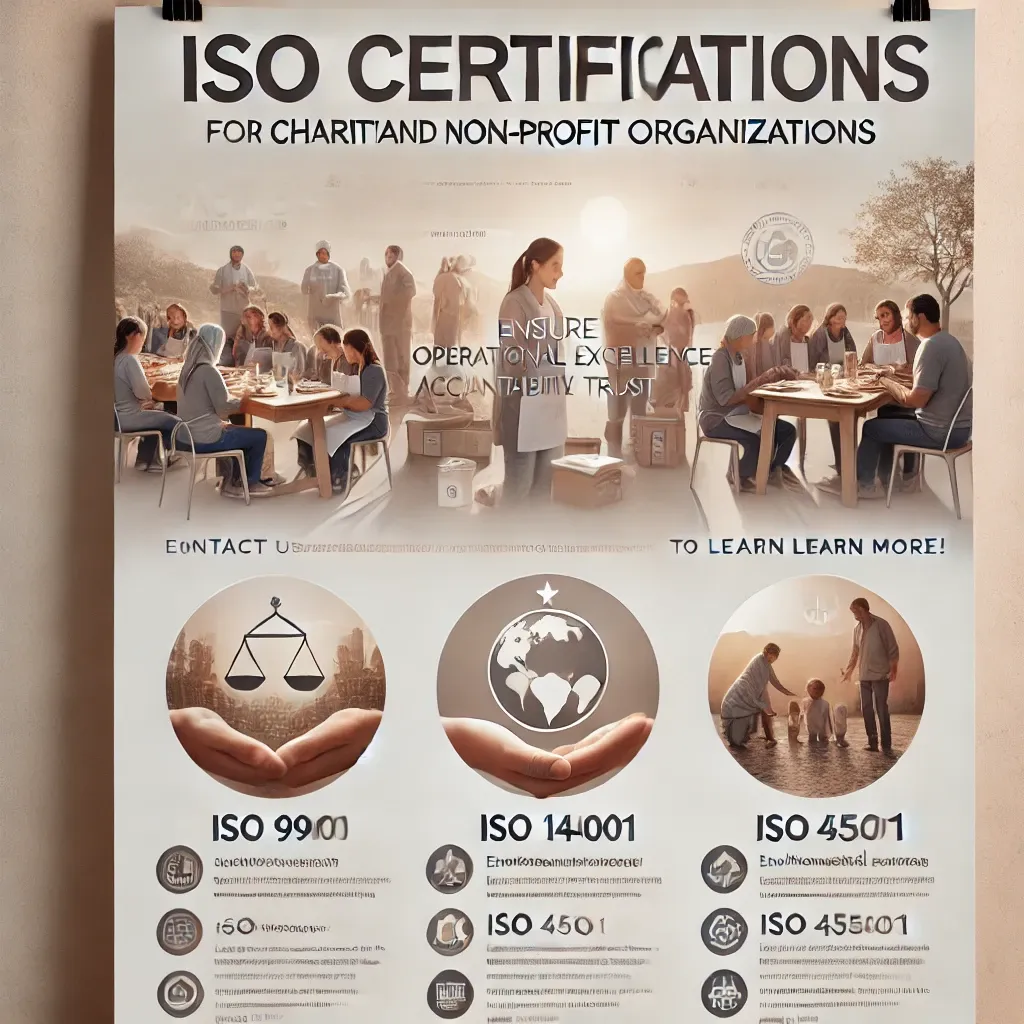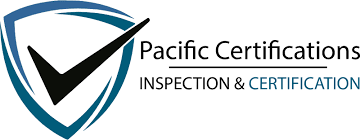ISO Certifications for Charities and Non-Profit Organizations, Requirements and Benefits

Introduction
Charities and non-profit organizations operate in an environment where transparency and trust are essential. Donors and regulators expect these organizations to uphold strong governance, ethical practices, and effective use of resources. The non-profit sector contributes over USD 2.9 trillion annually to the global economy, employing tens of millions of people. Yet, issues such as fraud, poor reporting, and governance gaps continue to affect the sector.
ISO certifications provide a framework that helps non-profits improve governance, manage risks, and ensure sustainable practices. They also build confidence with donors, strengthen compliance, and enhance the delivery of services to communities.
ISO 9001 for Quality Management Systems helps non-profits align processes, improve service delivery, and increase donor and beneficiary satisfaction. ISO 14001 for Environmental Management is valuable for non-profits focused on sustainability, helping them reduce their environmental impact through responsible resource management. ISO 27001 for Information Security Management is crucial for protecting sensitive data, ensuring compliance with privacy regulations.
For charities and non-profits, ISO certifications provide structured systems that build trust & ensure accountability.
Quick Summary
ISO certifications help charities and non-profits strengthen accountability, transparency, and donor trust. Key standards include ISO ISO 9001, ISO 37001 (anti-bribery), ISO/IEC 27001, and ISO 22301. Certification improves governance and improves credibility, making organizations more resilient to funders in a competitive sector.
For ISO certification support, contact [email protected].
Applicable ISO Standards for Charities and Non-Profit Organizations
Below are the most relevant ISO standards applicable to international NGOs, local charitable foundations, community development organizations, and social service providers:
ISO 9001:2015 - Quality Management Systems
ISO 9001 enables non-profits to standardize program delivery processes, donor communication protocols, beneficiary services, and monitoring systems ensuring consistent quality and demonstrable impact. This universally recognized standard helps organizations implement continuous improvement reducing service gaps, improving beneficiary satisfaction, and strengthening accountability to donors and regulators.
ISO 26000:2010 - Guidance on Social Responsibility
ISO 26000 provides comprehensive guidance on social responsibility covering organizational governance, human rights, labor practices, environment, fair operating practices, consumer issues, and community development—core principles fundamental to non-profit missions. This standard helps charities integrate responsible behavior throughout operations, enhance stakeholder engagement, improve credibility of impact reports, and align with international human rights conventions and sustainable development goals.
ISO 14001:2015 - Environmental Management Systems
ISO 14001 helps organizations improve their environmental performance through more efficient use of resources and reduction of waste, this standard is particularly relevant for Non Profit with a focus on environmental issues or those looking to reduce their environmental impact.
ISO 45001:2018 - Occupational Health and Safety Management Systems
ISO 45001 provides a framework for managing occupational health and safety risks, for Non-profit organizations, this certification ensures a safe working environment for employees and volunteers, which is critical for their wellbeing and productivity.
ISO 31000:2018 - Risk Management
ISO 31000 provides frameworks for identifying and managing risks unique to non-profits including funding volatility, reputational damage, fraud, operational failures, and beneficiary safety issues. This standard helps organizations systematically assess vulnerabilities across governance, programs, finances, and compliance implementing controls that protect mission continuity and stakeholder confidence.
ISO 22301:2019 – Business Continuity Management Systems
ISO 22301 is critical for charities delivering essential services in humanitarian aid, healthcare, education, and disaster relief where operational continuity directly impacts vulnerable populations. This standard enables organizations to identify potential disruptions including natural disasters, funding shortages, security incidents, and cyber attacks, then establish recovery strategies maintaining critical programs within defined timeframes.
ISO 37001:2016 - Anti-Bribery Management Systems
ISO 37001 is critical for charities protecting donor funds from corruption, fraud, and misappropriation through systematic controls preventing bribery in program delivery, procurement, and partnerships. With accountability being essential for donor trust and funding access, this standard establishes policies, procedures, and monitoring mechanisms ensuring ethical fund utilization and compliance with anti-corruption regulations.
Click here to find out more applicable standards to your industry
What are the Requirements of ISO Certifications for Charity and Non-Profit Businesses?
Charitable and non-profit organizations seeking ISO certification must establish and maintain documented policies, procedures, and records aligned with the selected ISO standards. Key requirements include the following:
ISO 9001:2015 – Quality Management Systems
Establish quality policy aligning with organizational mission, beneficiary needs, and donor expectations with documented commitment to consistent program delivery
Document standard operating procedures for program design, beneficiary selection, service delivery, monitoring and evaluation, and stakeholder reporting workflows
Implement key performance indicators measuring program outcomes, beneficiary satisfaction, service delivery timelines, resource utilization efficiency, and donor communication effectiveness
Define stakeholder engagement processes covering beneficiary feedback mechanisms, donor reporting requirements, volunteer management, and partnership coordination protocols
Maintain records demonstrating program implementation, beneficiary services provided, quality monitoring results, corrective actions for deficiencies, and continuous improvement initiatives
Conduct management reviews assessing organizational performance against mission objectives, program effectiveness, stakeholder satisfaction, and operational efficiency
ISO 37001:2016 – Anti-Bribery Management Systems
Conduct bribery risk assessments identifying corruption vulnerabilities in program procurement, vendor selection, beneficiary targeting, partnership arrangements, and government interactions
Establish anti-bribery policies prohibiting all forms of corruption with clear consequences and mandatory compliance requirements for staff, volunteers, and partners
Implement due diligence procedures for vendors, contractors, local implementing partners, and intermediaries assessing corruption risks and requiring anti-bribery commitments
Define financial controls including segregation of duties for fund disbursement, dual authorization requirements, transparent procurement processes, and expenditure monitoring systems
Maintain gifts and hospitality registers documenting all benefits received or provided with approval thresholds and disclosure requirements preventing conflicts of interest
Establish whistleblower protection mechanisms enabling confidential reporting of suspected bribery with investigation procedures and non-retaliation guarantees
ISO/IEC 27001:2022 – Information Security Management Systems
Conduct information security risk assessments identifying threats to donor databases, beneficiary records, financial systems, volunteer information, and organizational communications
Implement access controls including user authentication, role-based permissions, password policies, and activity logging for all databases and information systems
Establish data protection procedures covering donor personal information, beneficiary confidential data, financial records, and organizational intelligence with encryption requirements
Define cybersecurity incident response plans addressing data breaches, ransomware attacks, system compromises, and unauthorized access with notification procedures for affected stakeholders
Maintain vendor security management for cloud services, payment processors, CRM platforms, and technology providers with security assessments and contractual data protection requirements
Conduct regular security audits, vulnerability assessments, and penetration testing identifying and remediating weaknesses in information systems and databases
ISO 31000:2018 – Risk Management
Establish risk management frameworks identifying organizational risks across governance, programs, finances, compliance, reputation, and operations with likelihood and impact assessments
Conduct regular risk assessments covering funding volatility, fraud and corruption, beneficiary safety, data breaches, regulatory non-compliance, and operational failures
Implement risk treatment plans with specific controls, mitigation strategies, contingency arrangements, and responsibility assignments for each identified risk
Define risk monitoring processes with key risk indicators, early warning mechanisms, and regular reviews ensuring risks remain within acceptable tolerance levels
Maintain risk registers documenting identified risks, assessment results, treatment plans, monitoring activities, and risk ownership across the organization
Integrate risk considerations into strategic planning, program design, partnership decisions, and resource allocation ensuring risk-informed decision-making
ISO 22301:2019 – Business Continuity Management
Conduct business impact analyses identifying critical programs, essential services, key stakeholder dependencies, maximum tolerable downtimes, and recovery time objectives
Develop continuity strategies including emergency funding arrangements, backup office facilities, alternative program delivery methods, and staff cross-training for critical functions
Establish communication protocols ensuring coordination with beneficiaries, donors, staff, volunteers, partners, and regulatory authorities during operational disruptions
Define emergency response procedures for various disruption scenarios including natural disasters, security incidents, funding crises, cyber attacks, and public health emergencies
Maintain resource inventories including emergency contact lists, backup equipment, alternative facility arrangements, emergency suppliers, and financial reserves supporting continuity
Conduct business continuity exercises testing recovery procedures, emergency communications, alternative program delivery, and plan effectiveness with documented improvement actions
Tip:Start by mapping your organization's top three accountability concerns—typically donor trust, data security, and program quality—then prioritize ISO standards addressing these areas. Document existing governance policies, financial controls, beneficiary protection measures, and quality monitoring systems, identifying gaps requiring enhancement. This focused approach delivers credible assurance to donors while strengthening operational effectiveness.
For more information on how we can assist your non-profit organization with ISO certifications, contact us at [email protected].
What are the Benefits of ISO Certifications for Charity and Non-Profit Businesses?
ISO certifications are suitable for international humanitarian organizations, local charitable foundations, community development NGOs, and social service providers.
Enhanced credibility and donor confidence through independent third-party verification of governance systems, financial controls, and operational effectiveness
Stronger competitive advantage in securing grants and corporate partnerships as funders increasingly require ISO certifications
Improved operational efficiency and resource utilization through streamlined processes, reduced waste, and better program management
Better protection against fraud, corruption, and fund misappropriation through systematic controls
Higher data security and beneficiary protection through comprehensive information security controls preventing breaches t
Greater transparency and accountability through documented processes, systematic reporting, and audit trails
Reduced regulatory compliance risks with ISO standards helping ensure adherence to charity commission requirements, tax regulations, data protection laws, and international funding conditions
Improved program quality and beneficiary satisfaction through standardized service delivery, monitoring systems, feedback mechanisms, and continuous improvement driving measurable social impact
Enhanced employee and volunteer engagement through clear roles, professional development opportunities, and systematic processes fostering motivated, capable teams aligned with mission objectives
Stronger organizational resilience and sustainability through business continuity planning, risk management, and governance systems
The global non-profit sector demonstrates substantial growth, valued at USD 313.74 billion in recent years and projected to reach USD 481.18 billion in the coming years at 6.3% CAGR, driven by increasing social awareness, corporate social responsibility initiatives, and technological advancements streamlining fundraising and operations. Donor expectations are intensifying with demands for transparency, measurable impact, documented governance systems, and compliance with anti-corruption and data protection regulations.
Organizations implementing ISO-certified management systems report measurable improvements including enhanced donor trust and funding access, reduced fraud and operational risks through systematic controls, improved program efficiency directing more resources to beneficiaries, and strengthened stakeholder confidence. ISO certification is transitioning from optional to expected, with major funders, corporate partners, and government agencies increasingly mandating ISO 9001, ISO 37001, and ISO/IEC 27001 certification for grant eligibility, charities recognized as third most trusted sector emphasizing importance of demonstrable data security and governance, and digital transformation enabling real-time compliance monitoring enhancing accountability.
How Pacific Certifications Can Help?
Pacific Certifications, accredited by ABIS, acts as an independent certification body for charity and non-profit businesses by conducting impartial audits against applicable ISO standards. Our role is to objectively assess whether documented management systems and organizational governance practices conform to international ISO requirements, based strictly on verifiable evidence and operational records.
We support non-profit organizations through:
Independent certification audits conducted in accordance with ISO/IEC 17021 standards ensuring objective assessment of governance, accountability, security, and quality systems
Practical assessment of real program operations, financial controls, beneficiary services, data security measures, and risk management frameworks
Clear audit reporting reflecting conformity status, specific findings, observations, and certification decisions based on documented evidence from organizational practices
Internationally recognized ISO certification upon successful compliance demonstration supporting grant applications, donor requirements, and partnership eligibility
Surveillance and recertification audits maintaining certification validity and verifying ongoing conformance with evolving standards and organizational growth
Contact us
If you need support with ISO certification for your charity business, contact us at [email protected] or +91-8595603096.
Author: Sony
Read more: Pacific Blogs

